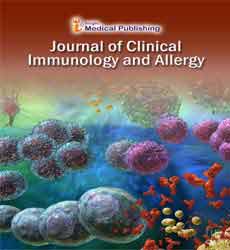Abstract
Vitamin D in Pediatric Asthma and Allergic Rhinitis: Benefits beyond Skeletal Health
Deficiency of Vitamin D in the Indian subcontinent is emerging as a major noninfectious epidemic. To correlate vitamin D deficient children with the asthma and allergic rhinitis classification and pulmonary function tests. We studied 66 children with asthma and allergic rhinitis between 6 to 12 years of whom 33 cases were administered Vitamin D and 33 controls who were not given Vitamin D. The ethical committee approval was taken. It was a prospective, randomised and comparative study. Data was analysed using mean, standard deviation and pairedt test. The study revealed 42 (63.6%) males and 24 (36.4%) females. The Asthma classification depicted mild persistent in 37 (56.1%) followed by intermittent 16 (24.2%) and moderate persistent 12 (18.2%). Maximum cases of allergic rhinitis were moderate persistent 42 (63.6%). The Children who received vitamin D had significant improvement of Forced Expiratory Volume in the first second (FEV1, p-0.000), Forced Vital Capacity (FVC, p-0.005), FEV1: FVC% (p-0.002) and Peak Expiratory Flow Rate (PEFR, p-0.000). The control group showed significant improvement in the PEFR parameter (p- 0.0077). The case group showed marked improvement in the lung functions. Adherence to the duration of therapy for a period of 10 weeks with Vitamin D is mandatory.
Author(s):
Fehmida Najmuddin and Keya Lahiri
Abstract | Full-Text | PDF
Share this

Google scholar citation report
Citations : 16
Journal of Clinical Immunology and Allergy received 16 citations as per google scholar report
Abstracted/Indexed in
- Google Scholar
- Directory of Research Journal Indexing (DRJI)
- WorldCat
- Publons
- Secret Search Engine Labs
Open Access Journals
- Aquaculture & Veterinary Science
- Chemistry & Chemical Sciences
- Clinical Sciences
- Engineering
- General Science
- Genetics & Molecular Biology
- Health Care & Nursing
- Immunology & Microbiology
- Materials Science
- Mathematics & Physics
- Medical Sciences
- Neurology & Psychiatry
- Oncology & Cancer Science
- Pharmaceutical Sciences


